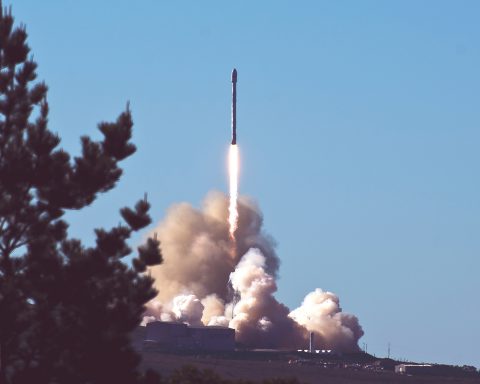For most of the last 75 years, the world has had the threat of nuclear war looming over it as world powers have leveraged this threat as a means to theoretically prevent further war. This threat, and the weapons behind it, have been deified in policy and culture. This modern salvation theory places nuclear weapons as the cornerstone of a new power structure, to the detriment of marginalized voices. Such deification runs contrary to Christian beliefs, and the Christian response should be opposition to prejudicial and oppressive powers, particularly as manifest in the artificial deification of these weapons.
The New Jersey Institute of Technology (NJIT) held a “Steps to a Nuclear-Free World Conference” in April, falling aptly on Palm Sunday. At its root, Palm Sunday is a statement on resistance to Empire—in Jesus’ time, to Rome—and to its ever-present and insidious forms of power and prejudice that manifest themselves in governments and individuals through oppression of “the other”.
___________________________________________
The deification of nuclear weapons perpetuates a structure of sovereign power that wrests safety and self-determination from the people and places the power of life and death squarely in the hands of those who have their finger on the trigger.
___________________________________________
While it was a secular conference at a state university, largely populated by individuals from secular organizations, the Steps to a Nuclear-Free World Conference made a similar statement in that it echoed those efforts to oppose the divisions created by violence and privilege. The conference’s central focus was that the unchecked proliferation of nuclear weapons is a hinderance to global peace and safety and that the very existence of these weapons is of significant concern. However, it also highlighted the intersections of nuclear militarism with oppressive international relations, and the panelists extended their foci to the environmental and social impacts as well. Opposing the proliferation of nuclear weapons is an extension of caring for the environment and for disenfranchised and marginalized populations. All of these areas transcend the lines between the secular and sacred, the church and the public.
Nuclear weapons threaten the nuclear powers and the marginalized world alike; the worship of these weapons as a savior—from global conflict—puts the world at risk. But the world does not need to remain at risk; the panelists proposed alternatives to the unsteady, uncontrolled ground that nuclear powers currently stand on. These steps are not limited to the powers of the majority. Concrete steps were given that can be enacted by the people who stand in opposition: the marginalized voices that have not traditionally been considered in international policy.
Robert Lifton introduced the idea of the deification of nuclear weapons to the conference.[1] The specter of this idea was still present in the ominous projections of the impact of nuclear weapons described by the panelists—impacts both physical and psychological. Lifton’s focus as a psychiatrist was on the emotional and psychological: why the global north has embraced these weapons, these “objects of deification,” as a form of “human salvation.” The narrative of nuclear weapons saving the world from further war is a story that has not played out historically; but has a dangerous appeal. It began as a more limited claim—saving the world from nuclear war—but has now expanded under recent American policy[2] to include the possibility of a nuclear response to biological and chemical warfare.
This purported salvation was first conceptualized through the doctrine of “mutually assured destruction,” a belief that no country will use nuclear weapons due to the consequences from retaliation. Nuclear weapons are thus seen as saving the world from their own danger, via the threat of its destruction. The weapons, perceived through a “perverse spiritualization,” as Lifton put it, have become the Angry God, who makes fear the primary motivator for action. This deified power becomes embodied in the countries who hold it, new forms of Empire that perpetuate a belief that military might, manifested in the threat of the use of nuclear weapons, is the salvation of the world. This belief creates a salvation theory tied to a significant disparity between countries and a cost to the safety of their own citizens and to the global community.
___________________________________________
If Christians today are to stand in opposition to colonialism, then opposing nuclear weapons is a logical extension of that opposition. The global south…has been historically ignored in discussions of nuclear weapons proliferation and use[.]
___________________________________________
The deification of nuclear weapons perpetuates a structure of sovereign power that wrests safety and self-determination from the people and places the power of life and death squarely in the hands of those who have their finger on the trigger. The fact that the United States can launch nuclear armaments in less than 20 minutes, and that Russia can do so in a fraction of that, 20 seconds, further underlines that by placing this power on a hair-trigger, it is placed precariously in very few hands.[3] The value of life and the taking of life becomes a decision with very little debate, despite the gravity of the consequences. Ultimately, the deification of nuclear weapons is antithetical to the belief that God is the one who saves and that it is done through love. It is the latter belief that Christians should embody through their actions. But the Angry God comes at the cost of our God of compassion.
Further, the specter that looms in the development and usage of nuclear weapons is a specter that does little material good for creation. Nuclear weapons production threatens the marginalized, those that do not have the “deterrent” power of possessing weapons as well as those that have no power to shift production away from their homes. The destructive potential of contamination by use elsewhere on the Earth or the threat of being labeled a target for being in the vicinity of the weapons puts these lives at risk with limited say to the contrary. The possession and the threat of use creates further divides between those who have the power – the decision power and the possessing power – and the ignored and marginalized, whose voices are not heard.
___________________________________________
Supporting the voices of the marginalized, making sure their voices are heard, and expanding and protecting voting rights are paramount to dismantling the appearance of moral power falsely placed in nuclear weapons.
___________________________________________
If Christians today are to stand in opposition to colonialism, then opposing nuclear weapons is a logical extension of that opposition. The global south—targeted by the Christian empires of the global north in historical colonialism, as well as the modern powers of neocolonialism—has been historically ignored in discussions of nuclear weapons proliferation and use, even though the use of nuclear weapons is a global threat, with environmental impacts being felt in all parts of the world, not just at the “target”. It is no surprise that the global south has had some of the most vocal voices in supporting international treaties to ban the proliferation of nuclear weapons, with the vast majority of signatory countries for the United Nations Treaty on the Prohibition of Nuclear weapons coming from regions which only stand to suffer from nuclear weapons usage and who have historically been ignored.[4] It is impossible to repent from a history of colonial oppression while continuing to silence voices and leverage power in the same ways today.
There are means to oppose this misplaced deference to nuclear might. One point which panelists brought up multiple times was the importance of marginalized voices. With his focus on black communities in America, Vincent Intondi found that, contemporary to the final stages of Second World War and thereafter, these communities opposed the use of nuclear armaments at a rate far greater than that of the general American public—in direct opposition to the power held and espoused by President Truman.[5] The global south and other non-nuclear power countries have been vocal about the support of international non-proliferation treaties, with Ray Acheson reporting that one hundred and twenty countries support the initiative to ban nuclear weapons.[6] Supporting the voices of the marginalized, making sure their voices are heard, and expanding and protecting voting rights are paramount to dismantling the appearance of moral power falsely placed in nuclear weapons. Awareness of the suppression of marginalized voices and the work to combat the oppression is an extension of movements within and outside the church of expanding the range of voices being heard in decision making. Moving the world away from deifying the power currently imbued in nuclear weapons and the ability to use them is going to take what Kelsey Davenport called a shift away from “transactional,” to a more “transformational” approach.[7] This approach would be one where the underlying and often systematic problems are brought to the surface and dealt with, instead of being strong-armed into submission.
To oppose this nuclear idol whose actions are determined by a select few, the global community must speak a different truth. By embracing a model of love and care for the world, its marginalized voices, and its environment, people may turn the tables on this power. This approach to opposing Empire can be undertaken at the personal and governmental levels, by listening to the oppressed and supporting the legislation and treaties that control this deified power. If a power is created and celebrated that is antithetical to foundational beliefs—such as care for the oppressed, global community, and the environment—then opposing this power is the morally logical step to take. Nuclear weapons and the power to enact nuclear war have become a false god, and opposition to it fits well with Christ’s resistance to the ways of Empire.
[1] Robert Lifton, “The Apocalyptic Twins: Nuclear and Climate Threats” (Presentation, April 14, 2019).
[2] Lisbeth Gronlund, “U.S. Military Options Should Not Include Starting a Nuclear War: The Security Benefits of a No-First Use Nuclear Policy” (Presentation, April 14, 2019).
[3] Bruce Blair, “An Overview of the Growing Risks and Humanitarian Consequences of Nuclear Weapons Use” (Presentation, April 14, 2019).
[4] UN Office of Disarmament Affairs, “Disarmament Treaties Database: Treaty on the Prohibition of Nuclear Weapons,” Treaties Database, accessed May 17, 2019, http://disarmament.un.org/treaties/t/tpnw.
[5] Vincent Intondi, “The Intersection of Race and Nuclear Weapons” (Presentation, April 14, 2019).
[6] Ray Acheson, “Treaty on the Prohibition of Nuclear Weapons and the International Campaign to Abolish Nuclear Weapons (ICAN)” (Presentation, April 14, 2019).
[7] Kelsey Davenport, “Nuclear Non-Proliferation and Missile Defense Particularly in Regards to North Korea and Iran” (Presentation, April 14, 2019).
***
Author Bio: Katie Nilsen Johnson is currently pursuing a master’s degree in Peace and Conflict Studies at Rutgers University-Newark. She is interested in the interplay of militarism, lived religion, and human rights, drawing on her prior work in holocaust studies and anthropology of religion.



Unbound Social